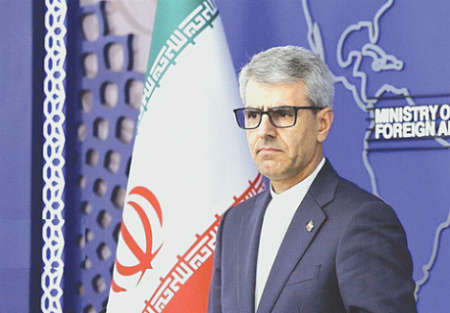
Last weekend’s talks between the United States and Iran in Oman focused exclusively on nuclear issues. This was announced on April 13 by the Ministry of Foreign Affairs of the Islamic Republic. Military and political issues, according to the Iranian official, were not included in the agenda of the meeting, which began with indirect consultations and ended with a short direct conversation between the special representative of the American president, Steve Witkoff, and Iranian Foreign Minister Abbas Araghchi. According to Western media reports, Tehran is seeking sanctions relief in exchange for a return to old levels of enrichment.
The official representative of Iran, Esmail Bagai, spoke about the substantive part of the negotiations that took place on April 12. According to him, Washington and Tehran did not discuss “anything beyond the nuclear program” of the Islamic Republic.
“I think it’s obvious that the American side made contact based on the same introductory information,” Bagai expressed confidence. “In accordance with the instructions we received from the country’s leadership, we were obliged to negotiate only on the nuclear issue and the lifting of sanctions.”
The Iranian diplomat said that the United States and Iran are currently consulting on the organization of the second round of negotiations. “We are currently discussing whether negotiations will take place in Oman or some other place, but Oman will continue to play the role of mediator in any case,” he said.
As for President Donald Trump, who initiated negotiations with Iran on the nuclear issue, the head of the White House told reporters while talking with them on board number one: the dialogue with the Islamic Republic is progressing well. “But that doesn’t mean anything until something is achieved,” the American leader explained, at the same time noting that “the situation with Iran is developing quite well.”
As sources informed The Wall Street Journal (WSJ), the Iranian negotiators at the meeting in Oman actively sought for the Trump administration to ease those American sanctions that caused the most severe damage to the national economy of the Islamic Republic. Separately, they made it clear that they want to gain access to billions of dollars that were frozen in Iran’s foreign accounts as part of previous restrictive measures. At the same time, Tehran is trying to ensure that the American side does not exert political and economic pressure on buyers of Iranian oil in China.
In return, Iran, according to WSJ sources, expressed its readiness to return to the same levels of enrichment of its nuclear materials that were established in 2015 under the Joint Comprehensive Plan of Action (JCPOA), the original nuclear deal that Trump decided to withdraw from during his first term as president.
According to the Iranian daily Kayhan, the written draft of the proposals submitted to Iran by Witkoff does not mention the “dismantling of the Iranian nuclear program” or any option with military action against Iran. The text allegedly quoted by Kayhan says that the negotiation process “only underlines the need to ensure the non-military use of Iran’s nuclear program.”
According to the WSJ, the purpose of the negotiations that began between the United States and Iran on April 12 was not to plunge into purely technical negotiations on ways to limit Iran’s nuclear activities in exchange for easing international sanctions, but to study the position of each side and lay a solid foundation for negotiations.
According to Iranian sources in The New York Times, Iran’s supreme leader Ali Khamenei agreed to talks with the United States only after internal briefings, during which Iranian officials tried to convince him of the need to build a dialogue with the United States. The fact that such consultations were held last month was confirmed by sources of the Reuters news agency. If the negotiation process between the United States and Iran fails, then the Islamic Republic will face American-Israeli bombing, and this, in turn, will call into question the stability of the Iranian political system, The New York Times reports the essence of the Iranian internal discussions.
This, according to sources in The New York Times, forced Iran to enter into negotiations with the United States. According to Washington, an exit from sanctions will ensure prosperity for the Iranian economy. The other day, the Iranian leadership stated that it was not against American investments in national projects, however, if negotiations were conducted without threats and ultimatums.
So far, as part of deterrence, the United States has made it clear that it is ready to saturate the nuclear industry of other Middle Eastern states with which they are allied. “We will sign an agreement with Saudi Arabia on cooperation in the field of energy and peaceful atom technologies,” US Secretary of Energy Chris Wright said in a speech in Riyadh on April 13. “We are working on localization of nuclear energy generation technologies in Saudi Arabia.” According to him, other details of cooperation between Washington and Riyadh will be revealed a little later – within a year.
